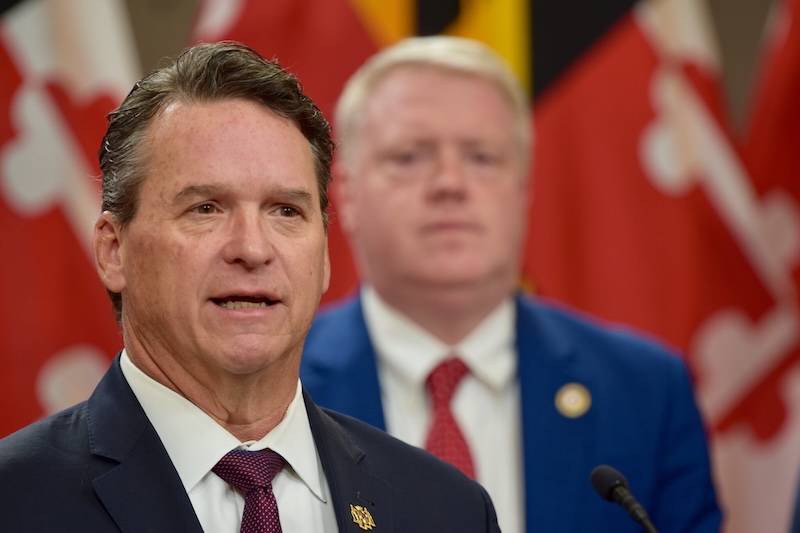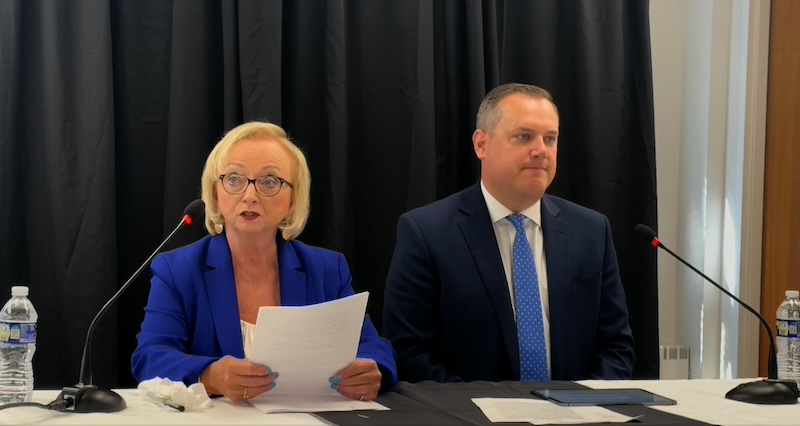Senate Minority Leader Stephen S. Hershey (R-Upper Shore) has formed an exploratory committee to weigh a 2026 bid for governor, citing the need for “balance” in a state that has gone “so far to the left” under Democratic control.
Hershey said he expects to make a decision sometime before the end of the year on whether he’ll challenge incumbent Gov. Wes Moore (D), who is all but guaranteed to be the Democratic nominee.
Hershey has said people had approached him recently about running, including one supporter who asked, “Is this really necessary?” In an interview with Maryland Matters on Thursday, he said it is necessary to provide real competition to Democrats and give voters a choice.
“Without real competition, Maryland loses balance. Without balance, there’s no incentive for moderation. I think that’s the big thing that we look at when we talk about Democrats crossing over and voting for a Republican governor, ” Hershey said.
“Right now, we have moved so far to the left with Gov. Moore and the composition of the state Senate and the House of Delegates that this pendulum needs to come back,” he told Maryland Matters. “We need to see more of a balance in Maryland. I think that’s one of the big things that I’d be able to offer.”
Hershey said his decision to form an exploratory committee crystalized after Ed Hale Sr. announced he would switch parties and run for governor as a Republican. The lifelong Democrat has never sought public office before, and conceded that his change in party affiliation was a recognition that he could not beat Moore in a Democratic primary.

Baltimore businessman Ed Hale Sr., a lifelong Democrat, plans to run for governor as a Republican. (Photo by Bryan P. Sears/Maryland Matters.)
Hershey criticized Hale as a political opportunist, and Hale responded in a radio interview that he had no idea who Hershey was. While Hale has announced his intention to and has created a state campaign account, he has yet to formally file as a candidate.
Democrats said it doesn’t matter who winds up as the GOP nominee, that person will be in for an unpleasant surprise in the general election.
“Stephen Hershey, Ed Hale Sr. and [former Gov.] Larry Hogan all have one thing in common: They’re out-of-touch Republicans who will lose to Wes Moore next year,” Kevin Donohoe, a spokesperson for the Democratic Governors Association, said in a statement. “Maryland Republicans now look like they’re set to have a messy primary filled with lackluster candidates who don’t have the spine to fight Donald Trump’s agenda that is crushing Maryland’s middle class. Good luck!”
Hershey, a senator for about 12 years, said aside from polling, his committee would test the fundraising waters. That would include cash in hand and “commitments from donors” should the exploratory committee turn into a formal campaign.
A late-2025 decision would put Hershey right up against the 2026 legislative session, during which Hershey — like all legislators and constitutional officers, including the governor — is banned from fundraising activities. But Hershey’s eventual running mate may not have those same restrictions.
Hershey could get around the prohibition by giving up his Senate seat — something he said flatly he would not do.
“One of the biggest concerns that I do have is I very much enjoy and appreciate the honor of representing District 36 as a state senator,” he said. “I am not willing to easily give up the opportunity to continue doing that.
“So as I’m looking at the opportunity, or the pathway to see if I would be able to defeat Gov. Moore in a general election, I am weighing that against the potential, the current and potential continued status of being a minority leader and representing our caucus over the next four years as well,” he said Thursday.
Hershey said he had been approached several times during the legislative session about running, but that the “intensity of the calls and messages and conversations have picked up dramatically since Ed Hale made his announcement.”
“So, yes, there is a part of me that is saying that the Republicans need to be represented in the race against Gov. Moore. I think that there is much concern over Ed Hale switching parties at the last minute and deciding to run as a Republican,” Hershey said. “And I said before, Republicans know the difference between conviction and convenience. So, it played a role — it may have just accelerated my decision to move forward with this.”
Hershey said he plans to spend the next 90 days polling and assessing the viability of a statewide campaign. That includes his ability to raise the money needed to challenge Moore, who has a proven ability to raise large sums of cash and is seen as a rising star in the Democratic Party.
Hershey’s announcement comes a day after a radio interview in which he teased the possibility of a run for governor.
Prior to 2002, Republicans had not held the governor’s mansion in nearly four decades.
Since 2002, the minority party — registered Democrats outnumber Republicans by about 2-1 — has won the governor’s seat in three of the last six elections. That includes Larry Hogan, who became the first Republican since Theodore McKeldin, to win consecutive terms as governor.
But those Republican governors won open seats: Unseating an incumbent Democrat seeking reelection has proven difficult.
“There is still an opportunity for a Republican to win, even though this would be a different path that we have taken in the past,” Hershey said. “We have not won against the incumbent governor before, but we have won after eight years of (two) Democratic governors. In both cases a tax-and-spend governor.
“I think what we’re going to find out in polling is that people — families — are hurting now, after four years of Gov. Moore, as they were after eight years of Gov. O’Malley. That’s where we’re thinking we’re going to see a notable difference in the reelection of Gov. Moore, as opposed to just running against an open seat,” he said.
Hershey’s announcement comes as one other top Republican remains on the fence considering his own future. Hogan continues to be talked about as a potential candidate for his former office and at times has stoked the speculation himself.
Hershey said he spoke to Hogan about his intentions early Thursday afternoon.
“The governor [Hogan] is still looking at the race from the perspective that a lot of people are asking him to do this as well,” Hershey said. “We’re both in agreement that this is … the more appropriate step for me to take in forming an exploratory commission.”
by Bryan P. Sears, Maryland Matters
September 4, 2025
Maryland Matters is part of States Newsroom, a nonprofit news network supported by grants and a coalition of donors as a 501c(3) public charity. Maryland Matters maintains editorial independence. Contact Editor Steve Crane for questions: [email protected].













